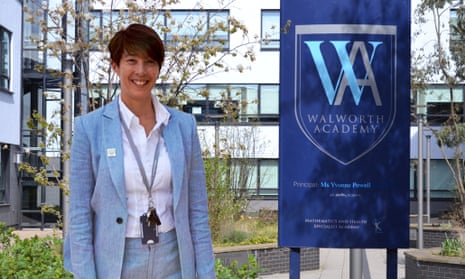If there’s one thing that Yvonne Powell is clear on it’s that when leading a school in a challenging area – where gang violence, sexual exploitation and poverty are big issues – you have to tackle problems head on. She believes that too often schools are concerned about how to address topics like sexual exploitation and female genital mutilation (FGM) because they worry they’ll cause offence.
“Unless we tell people that they’re wrong and protect children, change views, and create a culture where pupils feel safe to tell us, then we’re not going to change the situation,” says Powell.
Since becoming head of Walworth Academy in south London two years ago, Powell and her team have tried to build an environment where students feel comfortable about sharing sensitive information. She has worked hard to make sure students know who the safeguarding officer is and introduced “Tell Us” boxes so students can discretely report issues. “Every week we have disclosures [of some kind],” she says. “And I’m proud that our children will tell us.”
You have to be values focused – as well as attainment driven – to create this culture, according to Powell. “We call ourselves a family, and that’s how we value each other,” she says.
As soon as she joined the academy, Powell set up an information-sharing group so that key members of staff know what’s happening with children and families outside of school. A police sergeant who covers a local estate, a housing officer and youth club workers are among those who attend group meetings.
She also works with external agencies to make sure that pupils are looked after when there are long breaks from school. “I don’t enjoy summer holidays,” she says. “If we’ve got students who are vulnerable, we make sure we get them into a youth club. And if their attendance is above 96% then we reward them for it because we know that they’re engaged in activities.” Students are also given a small laminated card with a number they can contact if they need help during the holidays.
This co-ordinated approach has been very effective, with a recent Ofsted report describing what the school does to secure the safety of students inside and outside the academy as “second to none”.
The safeguarding officer is an ex-social worker and all staff have received training in the relevant areas, there is a strong pastoral team, and students have access to counsellors. There are workshops targeting issues such as how to move away from being in a gang, knowing you have the right to say no, and raising self-esteem. Shortly Powell is planning to run a programme addressing how boys view girls. “We have to almost assume that boys see it as the norm [to see girls as sexual objects] to tackle it head on,” she says. The course will involve discussions during tutor periods, assemblies and other activities.
Alongside this close attention to pastoral care, there is an unrelenting drive towards improving results. The reason Powell chose to work for an Ark school is that the organisation has a no-excuses attitude when it comes to attainment.
“My philosophy is that every student wants to succeed but at times there are barriers that we help remove,” says Powell.
Since taking on the school, the headteacher has shaken up the curriculum model to put depth before breadth, with the number of subjects students take based on the level they’re at. For example, if a student is struggling with literacy, they won’t study many other subjects until their reading and writing are secure. The reasoning is that it’s much better for a young person to have fewer GCSEs that include A* to C’s in English and maths than a host of D’s and E’s.
“We won’t change the course of students based on expected national outcomes,” says Powell.
The school also supports parents to develop skills. Currently, seven parents are taking a GCSE in maths, and around 40 carers recently attended a class designed to help them support their child with maths homework.
The parent support group has grown massively over the past couple of years. There are four parent leaders who tell the school what provision would be helpful. They also run a drop-in surgery where carers can talk about any issues relating to their child or the curriculum, and workshops on topics like applying to university. “Unless we empower and enable people by giving them the knowledge, how can they further support their child?” Powell asks.
Understanding the complexities of the community she serves is at the core of everything that Powell does. There is a lot more work that she’d like to do at the school – increasing students’ intrinsic motivation is one of the next areas she’s focusing on – , but she will never waver on the holistic approach to education.
“Of course [we’re driven by results], I want the best for my students. But they are young people, and one thing we have to make sure of is that we teach them how to make the right choices,” she says.
“That’s where we’ve got a lot more work to do. People might call them the soft skills, but I don’t think they are. It’s about teaching children to be resilient, adaptable, flexible, confident, articulate and knowing what to consider when making the right choices. What are we educating them for? We don’t know. We don’t know what their lives are going to be like in 20 years’ time, but what we do know is that they must know how to keep themselves safe now.”

Comments (…)
Sign in or create your Guardian account to join the discussion